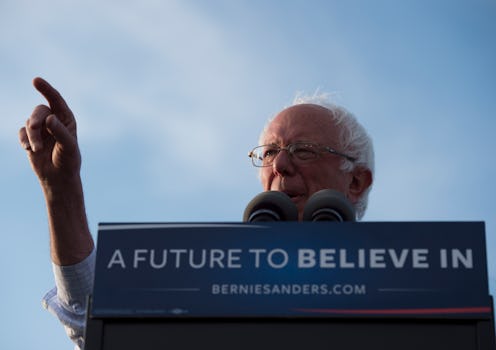News
Does Sanders Have A Chance?
The primaries are winding down quickly, as both parties have solidified their presidential nominees. On the one hand, conservative voters have made clear that they want reality TV star Donald Trump to run the country, despite the GOP establishment trying to stop them. And on the other, Democratic hopeful Hillary Clinton declared herself the party's presumptive nominee on Tuesday night after big wins in New Jersey and California. There is still one more contest coming up for the Dems in D.C. on June 14. But will Washington's delegates mean anything for Bernie Sanders?
D.C. holds a small number of pledged delegates. Thirteen of the 20 total pledged delegates are allocated on a proportional basis, and the remaining seven depend on the district-wide vote. However, Clinton is expected to do well in the District, and with such a small number of delegates to be won there, it's probably not going to have a big stake in Sanders' campaign.
Sanders currently holds 1,828 pledged delegates from the primaries thus far, compared to Clinton's 2,203. Considering the fact that the Democrats need 2,383 delegates to secure the nomination, it doesn't look like D.C. will do much for Sanders. Take that and throw in Clinton's recent endorsements from President Obama, Vice President Joe Biden, and Massachusetts Sen. Elizabeth Warren, and it looks like it's over for Sanders.
However, Sanders will still continue his campaign through to the party's convention in July, and his superdelegates will likely stand by him to the end. But Sanders isn't necessarily sticking it out because he wants to win. Taking his campaign all the way to the convention can at least make a point to the Democratic establishment that people want change and their votes to heard, and Sanders wants to represent his supporters as long as he possibly can.
While Sanders likely won't be the next president of the United States, he has succeeded in mobilizing a large number of people seeking change. And at the end of the day, many of this year's young voters were more likely to vote based on the issues they cared about than the particular candidate.
Sanders was able to give voters a voice in the type of government they're looking for. He did so by running in a major political party as a democratic socialist while calling for a "political revolution" — two things the establishment is definitely afraid of. So maybe D.C. won't mean much for his campaign, but he's likely staying in the race for a bigger reason.
